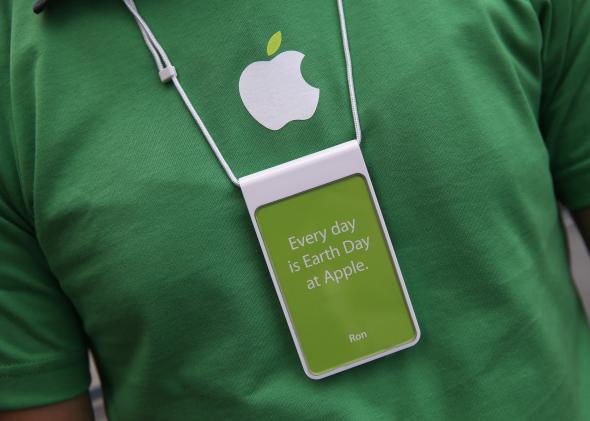This story first appeared in Inc.
More than half of Americans say they worry about global warming. But what are they doing about it?
Probably not as much as they think. As any behavioral psychologist could tell you, there’s a significant rift between an individual’s priorities and one’s actual behaviors. A new company called Oroeco seeks to address this rift as it applies to carbon footprints.
This Earth Day, Oroeco is bringing its website out of beta. The site, roughly two years in the works, allows individuals to sync their purchases on spending-analysis tool Mint.com (which is entrepreneur-founded, but now owned by Intuit) with Oroeco in order to discover and monitor the carbon emissions associated with their purchases, say, groceries or a monthly electric bill.
From there, the website—and, soon, an app—can estimate your entire monthly carbon footprint. Moreover, it can compare your consumption, and C02 used, to that of your neighbors, or your Facebook friends. If you don’t do so hot for the month—say, you fly from New York City to Bangkok and back, which means you caused an estimated 7,000 pounds of carbon dioxide to be emitted—you can purchase carbon offsets directly through Oroeco to lower your footprint. Simply using the site for analysis is free.
“We’re initially targeting folks who already care about climate change, which is the majority of people,” says Oroeco founder Ian Monroe, who spent most of the past decade at nonprofits, nongovernmental organizations, and governmental organizations, working on initiatives to fight climate change. “Our primary goal is to drive change in consumers’ behaviors. There’s this gap we all have in what we care about and what we all actually do day-to-day.”
Monroe started working on the ideas for Oroeco in 2011 in San Francisco and incorporated the company and raised $15,000 and the following year in an Indiegogo campaign, which also generated the company’s first 150 beta testers of its Web app. The Web app has just 250 users in advance of the Earth Day beta launch.
There are a few carbon-emissions calculator apps already on the market (most are free), including Leafully, and some by nonprofit groups or energy-source advocates, including the Propane Education and Research Council. The site GoodGuide locates environmentally friendly products; currently the most notable company in the energy-consumption monitoring space is Opower, which recently went public.
In addition to showing users how their environmental footprint compares to that of their neighbors, the Oroeco app also gives both friendly suggestions—and rewards—for cutting that number. If a user eats less red meat or cuts plastic bags from her life, she can not only can earn in-app badges, but also real-life prizes, such as a Nest Thermostat.
“We also estimate the average household can save $1,000 a year by making really simple changes to their habits,” Monroe says.
It’s pretty refreshing to see a team of successful startup folks and hackers (by the way, it’s a woman-led team of developers, also a refreshing rarity) come together for a goal that’s more about doing good than making money. While it’s structured as a company and has three different revenue streams in mind, Oroeco has so far forgone seeking significant venture-capital funding in favor of grants and an Indiegogo campaign (it has about $91,000 in grants and awards, and $40,000 in angel funding). And while some employees are paid by this, Monroe doesn’t pay himself. He also doesn’t pay office rent.
“We are a pioneer of the sustainable office, in that we don’t really have one,” Monroe says, explaining that the whole Oroeco team works remotely.
The business model from the start is simply taking a small cut from sales of carbon offsets from its partner, Impact Carbon. Monroe is floating the ideas of offering premium services, and, as a third line of revenue, adding affiliate advertising.
One significant challenge for the company will be expanding internationally. In the United States, its integration with Mint.com allows tracking of users’ purchases—but there’s no Mint.com or equivalent on other continents, due primarily to differences in banking regulations.
What Oroeco is trying to tackle is also a difficult problem from a behavioral standpoint. It’s far easier to reward outright positive behavior than to try to cut down on negative behavior. I asked Monroe how Oroeco can accomplish this when a user continues to see her negatives—creating carbon emissions—tick up and up.
He admits it’s a challenge, one on which the company is working with researchers at Stanford University and University of California–Berkeley to learn the best ways with which to interact with users. Monroe says for now, the company’s Web app focuses on the positive: It gives tips to users and also prompts positive behaviors, such as biking to work or installing solar panels. Plus, the ability for users to compare themselves to local averages and, specifically, their friends, might provide a big psychological push for them.
“Once we have information in the right place and incentives in the right place, we can build on that social benchmarking and play off that desire to not just be as good as average,” Monroe says. “If you want to be better than average, and achieve that, it’s always going to be pushing that average down. We can move the needle on carbon output that way.”
See also: Why Going Green Means Big Business in the Construction Industry
